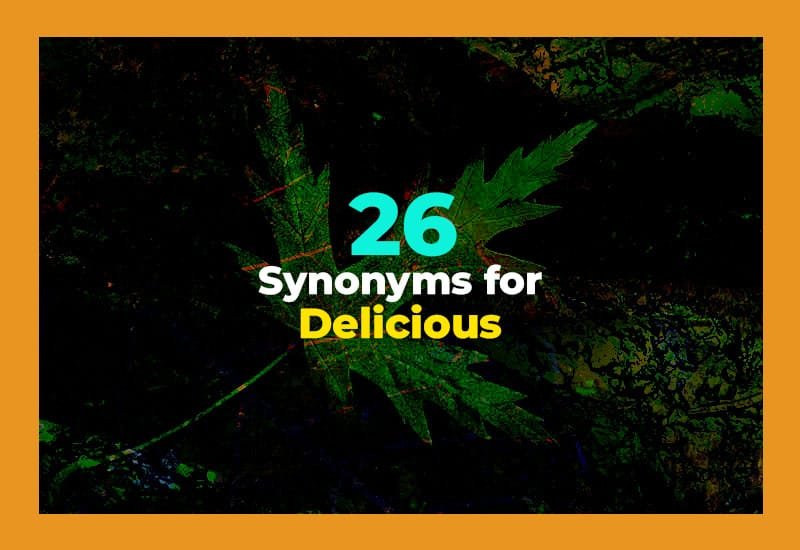When talking about food, finding the right word to describe how tasty something is can really make your sentences pop. Instead of always saying delicious, you can try words like scrumptious, mouthwatering, or heavenly. In this article, we'll explore 26 synonyms for delicious and show how to use them in sentences for more flavorful writing.
| Synonym | Meaning | Example |
|---|---|---|
| Scrumptious | Extremely tasty or appetizing | That chocolate cake looks absolutely scrumptious. |
| Mouthwatering | Makes you want to eat it immediately | The aroma of the pizza was mouthwatering. |
| Delectable | Highly pleasing to taste or smell | The chef prepared a delectable seafood platter. |
| Heavenly | Delightful, as if from heaven | The ice cream had a heavenly texture and flavor. |
| Savory | Pleasing to taste, often salty or spicy | The savory stew warmed everyone on a cold day. |
| Tasty | Pleasant in flavor | She cooked a tasty pasta that everyone loved. |
| Appetizing | Appealing to the appetite | The appetizers looked very appetizing on the table. |
| Flavorful | Full of flavor | The curry was rich and flavorful. |
| Luscious | Juicy and deliciously rich | The peaches were luscious and sweet. |
| Toothsome | Pleasing to the taste | The chocolate truffles were toothsome delights. |
| Yummy | Very pleasant to eat | The cookies fresh from the oven were yummy. |
| Palatable | Acceptable or agreeable to taste | The dish was palatable, though a bit mild. |
| Ambrosial | Extremely pleasing to taste or smell | The wine had an ambrosial aroma. |
| Finger-licking | So tasty you want to lick your fingers | The fried chicken was finger-licking good. |
| Sumptuous | Rich and appealing to taste | The buffet featured a sumptuous variety of foods. |
| Rich | Full-bodied flavor | The chocolate mousse was rich and creamy. |
| Exquisite | Extremely beautiful or delicate in flavor | The handmade pastries were exquisite. |
| Delish | Slang for very tasty | This smoothie is totally delish! |
| Zesty | Bright, piquant flavor | The zesty lemon tart was refreshing. |
| Piquant | Pleasantly spicy or tangy | The salsa was piquant and full of flavor. |
| Divine | Perfectly delicious | The homemade bread was divine. |
| Heavenly-tasting | Suggests a taste so good it's like heaven | The cheesecake was heavenly-tasting. |
| Mouthwatering-good | Extremely appetizing | The barbecue ribs were mouthwatering-good. |
| Appetizing-looking | Looks so good it makes you hungry | The chocolate fondue was appetizing-looking. |
| Ambrosial-flavored | Taste like it came from the gods | The truffle risotto was ambrosial-flavored. |
26 Different Ways to Say DELICIOUS: Another Word for DELICIOUS
Scrumptious
Scrumptious is perfect when you want to express that food is extremely tasty. It gives a sense of indulgence and satisfaction, making it more than just ordinary. You can use scrumptious for desserts, snacks, or even savory dishes. It's a great way to show excitement about what you're eating and share the joy of flavors with others. People often use it in casual conversations or when describing meals in blogs and social media posts. Using scrumptious makes your writing lively and appetizing.
- The cookies she baked were absolutely scrumptious.
- We enjoyed a scrumptious brunch at the new cafe.
- That steak looks scrumptious with the herbs on top.
Mouthwatering
Mouthwatering describes food that makes you salivate just by looking at it or smelling it. This word emphasizes how appealing a dish is and can be used for anything from a juicy burger to a fresh pastry. It's perfect when you want to convey the irresistible nature of food. Using mouthwatering can excite readers or listeners, making them imagine the flavors vividly. It works well in menus, reviews, and casual chats about meals. Mouthwatering is expressive and gives a sensory feel to your writing.
- The aroma of fresh bread was mouthwatering.
- Her chocolate cake was mouthwatering and rich.
- That pizza looks mouthwatering with extra cheese.
Delectable
Delectable is elegant yet approachable for describing food that's extremely pleasing to the taste. It works for both sweet and savory dishes and adds a refined touch to your description. Delectable is versatile and often used in restaurant reviews, cooking blogs, or when praising someone's homemade meal. It implies quality, attention to detail, and careful preparation. Using this word can make ordinary dishes sound impressive and appetizing. It's ideal for formal or semi-formal contexts without sounding stiff.
- The chef served a delectable lobster bisque.
- We had a delectable dessert platter after dinner.
- The homemade cookies were simply delectable.
Heavenly
Heavenly suggests that food is so delicious it feels divine. It's often used for desserts or indulgent treats but can describe any exceptional dish. This word conveys blissful enjoyment and satisfaction. It's perfect for sharing the pleasure of a meal with readers or friends. Heavenly can also be used metaphorically to describe experiences beyond food. Using this word adds a sense of delight and wonder to your description.
- That chocolate mousse was heavenly.
- We tasted a heavenly apple pie yesterday.
- The cheese platter was heavenly and rich.
Savory
Savory refers to food that is flavorful and often not sweet. It's used for dishes like stews, roasts, or spiced meals. Using savory emphasizes taste and depth rather than sweetness. It's great when discussing meals with complex flavors or comfort food. Savory can also suggest a satisfying, filling experience. This word works in both casual and culinary-focused writing, adding a professional touch to your food descriptions.
- The savory chicken pot pie was perfect for dinner.
- We enjoyed a savory mushroom risotto.
- That beef stew smelled savory and rich.
Tasty
Tasty is a friendly and approachable word for any dish that tastes good. It's flexible for desserts, main courses, or snacks. Using tasty conveys enjoyment without exaggeration and works well in conversation and casual writing. It's the go-to choice when you want to express satisfaction quickly. Tasty can also complement other descriptive words for more expressive sentences. This makes it reliable for both speaking and writing about meals.
- She prepared a tasty lasagna for dinner.
- The tacos were surprisingly tasty.
- We had a tasty salad with fresh ingredients.
Appetizing
Appetizing focuses on food that looks and smells appealing, making you want to eat it immediately. It's perfect for describing the visual and sensory aspects of meals. Using appetizing can enhance menus, food blogs, or social media posts. This word draws attention to presentation as well as flavor. It suggests care in preparation and the pleasure of anticipation before tasting. Appetizing works for both casual and professional contexts.
- The platter looked appetizing with colorful vegetables.
- Her homemade bread smelled appetizing.
- The dessert tray was very appetizing.
Flavorful
Flavorful emphasizes richness and depth of taste. It's ideal for foods seasoned well or with complex flavors. Using flavorful highlights the quality and thought put into cooking. This word works well for main courses, soups, and sauces. It conveys enjoyment and encourages the audience to savor each bite. Flavorful can elevate simple dishes by showing appreciation for taste.
- The curry was spicy and flavorful.
- She made a flavorful tomato sauce.
- The roast chicken was perfectly flavorful.
Luscious
Luscious suggests juicy, rich, and extremely pleasing flavors. It's often used for fruits, desserts, or indulgent treats. Using luscious emphasizes texture as well as taste. This word adds a sense of luxury and indulgence to food descriptions. Luscious works well for blogs, social media, or conversations about gourmet meals. It conveys an irresistible appeal that draws readers in.
- The peaches were luscious and ripe.
- We enjoyed a luscious chocolate tart.
- That smoothie looked luscious and creamy.
Toothsome
Toothsome is a charming way to describe food that's pleasing to taste. It works for both everyday meals and special dishes. Using toothsome highlights how enjoyable eating the food is. It's a bit old-fashioned but adds a unique flavor to your writing. This word can make ordinary dishes sound more appealing and memorable. Toothsome is versatile for savory and sweet foods alike.
- The chocolate truffles were toothsome.
- The roast lamb was tender and toothsome.
- We had a toothsome batch of muffins.
Yummy
Yummy is fun and expressive, perfect for casual conversations or writing about food you love. It works for all types of dishes, from snacks to desserts. Using yummy conveys delight and satisfaction in a friendly tone. It's widely understood and instantly recognizable. Yummy adds energy and warmth to your description, making it relatable. It's ideal for sharing experiences with friends or followers.
- The cookies were fresh and yummy.
- She made a yummy pasta dish.
- That ice cream cone looks yummy.
Palatable
Palatable refers to food that is agreeable and enjoyable to taste. It works for meals that are satisfying and well-prepared. Using palatable can describe dishes that please a broad range of tastes. This word is useful in reviews or when giving feedback on recipes. Palatable also conveys balance and careful preparation. It's versatile for formal and casual discussions about food.
- The soup was palatable and comforting.
- That sandwich is palatable with fresh ingredients.
- We found the dessert very palatable.
Ambrosial
Ambrosial is poetic and suggests divine or heavenly flavor. It's often used for gourmet dishes or exceptional desserts. Using ambrosial adds sophistication and admiration to your description. This word conveys that the food is extraordinary and memorable. It works well in formal writing, culinary reviews, and creative storytelling. Ambrosial creates a sense of awe around flavors.
- The chocolate cake was ambrosial.
- She served an ambrosial fruit tart.
- The wine had an ambrosial aroma.
Finger-licking
Finger-licking is vivid and playful, describing food so good you want to savor every bit. It's often used for fried or indulgent dishes. Using finger-licking adds energy and excitement to your description. This word works well in casual writing, reviews, and social media posts. Finger-licking conveys a strong sense of satisfaction. It makes your sentences fun and engaging.
- The fried chicken was finger-licking good.
- Her ribs were finger-licking tasty.
- We had finger-licking barbecue wings.
Sumptuous
Sumptuous suggests richness, luxury, and delight in food. It works for lavish meals, buffets, or gourmet dishes. Using sumptuous emphasizes indulgence and satisfaction. This word conveys care in preparation and presentation. Sumptuous is ideal for writing about special occasions or high-quality food. It gives a sense of grandeur to your descriptions.
- The buffet featured a sumptuous spread.
- We enjoyed a sumptuous seafood dinner.
- The chocolate dessert was sumptuous.
Rich
Rich highlights full-bodied, intense flavor in food. It's commonly used for chocolate, sauces, and creamy dishes. Using rich conveys indulgence and satisfaction. This word emphasizes taste and texture simultaneously. Rich is versatile, suitable for desserts, main courses, or beverages. It adds depth to your food descriptions.
- The chocolate mousse was rich.
- Her stew had a rich flavor.
- We had a rich and creamy sauce.
Exquisite
Exquisite describes food that is delicate, refined, and exceptionally pleasing. It works for pastries, fine dining, or special treats. Using exquisite adds elegance and admiration to your sentences. This word conveys careful preparation and exceptional quality. Exquisite is perfect for blogs, reviews, or any context celebrating culinary skill. It makes food sound both beautiful and delicious.
- The handmade chocolates were exquisite.
- We tasted an exquisite souffle.
- The pastries were exquisite and delicate.
Delish
Delish is playful and modern, expressing that something is very tasty. It works for informal contexts, social media, or friendly conversations. Using delish conveys enjoyment and excitement about food. This word is approachable and energetic. Delish adds personality to your descriptions and connects easily with readers. It works for almost any type of food.
- This smoothie is totally delish!
- Her cookies were delish and fresh.
- That pizza slice looks delish.
Zesty
Zesty describes bright, lively, and piquant flavors. It's great for citrus, sauces, or spicy dishes. Using zesty highlights freshness and excitement in food. This word conveys energy and appetite stimulation. Zesty works well in menus, reviews, and casual writing. It makes your descriptions pop with flavor and personality.
- The lemon tart was zesty.
- She prepared a zesty salsa.
- The dressing had a zesty kick.
Piquant
Piquant means pleasantly spicy or tangy, adding flavor without overwhelming. It works for sauces, soups, and dressings. Using piquant emphasizes sophistication and balanced taste. This word conveys skillful seasoning and enhances appetite appeal. Piquant is ideal for food lovers or culinary writing. It adds precision to your descriptions.
- The salsa was piquant and flavorful.
- She made a piquant mustard sauce.
- That soup had a piquant twist.
Divine
Divine implies perfection in taste, making food feel extraordinary. It works for desserts, meals, or indulgent treats. Using divine conveys delight and admiration. This word is strong and expressive, perfect for emphasizing exceptional quality. Divine adds a sense of magic and satisfaction to your sentences. It works in casual chats or elegant writing.
- The homemade bread was divine.
- Her chocolate cake tasted divine.
- The ice cream was divine and creamy.
Heavenly-tasting
Heavenly-tasting describes food so good it feels celestial. It works for desserts or indulgent treats. Using heavenly-tasting conveys pure enjoyment and satisfaction. This word emphasizes pleasure and delight in eating. Heavenly-tasting can make your descriptions vivid and memorable. It works well for storytelling, blogs, or reviews.
- The cheesecake was heavenly-tasting.
- Her cookies were heavenly-tasting.
- That chocolate tart was heavenly-tasting.
Mouthwatering-good
Mouthwatering-good stresses how appetizing and irresistible food is. It works for anything that excites the appetite immediately. Using mouthwatering-good conveys enthusiasm and appeal. This word makes your descriptions vivid and expressive. It's ideal for menus, blogs, and casual sharing. Mouthwatering-good engages the senses and sparks craving.
- The barbecue ribs were mouthwatering-good.
- Her pizza was mouthwatering-good.
- The dessert looked mouthwatering-good.
Appetizing-looking
Appetizing-looking focuses on appearance and sensory appeal of food. It works for meals that look inviting and fresh. Using appetizing-looking draws attention to visual enjoyment. This word is perfect for blogs, social media, or reviews. It emphasizes the importance of presentation. Appetizing-looking makes dishes more enticing to readers or viewers.
- The chocolate fondue was appetizing-looking.
- Her salad was appetizing-looking.
- The cake was appetizing-looking and colorful.
Ambrosial-flavored
Ambrosial-flavored describes food with divine, unforgettable taste. It works for gourmet dishes and fine desserts. Using ambrosial-flavored conveys admiration and uniqueness. This word emphasizes flavor excellence and sophistication. Ambrosial-flavored makes your writing feel luxurious and special. It's perfect for culinary reviews and food storytelling.
- The truffle risotto was ambrosial-flavored.
- The chocolate tart was ambrosial-flavored.
- That dessert had an ambrosial-flavored twist.

Final Thoughts
Expanding your word choices makes food writing more engaging and expressive. Using these synonyms helps describe taste vividly and adds flair to your meals' stories. Mix and match to suit every dish you want to celebrate, from everyday snacks to gourmet creations.









